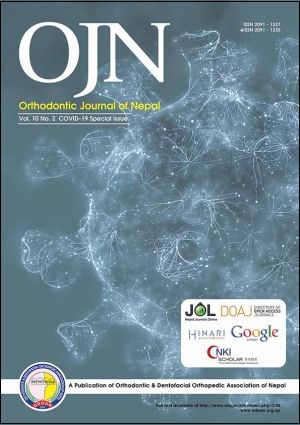Study on the effectiveness of online classes for undergraduate medical and dental students of Gandaki Medical College during COVID 19 pandemic period in Nepal
DOI:
https://doi.org/10.3126/ojn.v10i2.31146Keywords:
COVID-19, Effectiveness, medical education, online classesAbstract
Introduction: Pandemic situation of COVID 19 had an impact on medical education globally leading to cancellation of lectures, laboratory exercises, clinical postings and exams. To continue with the academic program, the online classes are started in different academic streams in large scale. This came with challenges and new learning opportunities for medical students and potential to adopt some changes. The objective of this study is to find out the effectiveness of online classes for medical and dental students of Gandaki Medical College (GMC) during COVID 19 pandemic period in Nepal with questionnaire based survey distributed to the students attending the online classes.
Materials and Method: This is a descriptive cross sectional questionnaire based online survey. The questionnaires were distributed to the undergraduate medical and dental students of GMC, Pokhara, Nepal.
Result: Amongst the students who responded, majority 205 (98.1%) were attending online classes. The device used by most of the student to attend the classes was smart phone 156 (74.6%). The strength of internet of the students was good in 41 (19.6%) and satisfactory in 99 (47.40%). The internet was disturbed by electricity cut down as responded by 66(31.6%) students. Almost 140 (67%) of the respondents rated the online classes were interactive and 124(59.33%) rated the classes were not disturbing. Despite the classes being interactive and non-disturbing, 162(77.51%) of respondents rated that the online classes were not effective. The online classes with one to 51 number of students showed good interactions as compared to classes with 51 to 100 number of students (p<0.01). There was no differences seen in the effectiveness in online classes between these medical and dental students (p=0.414).
Conclusion: Good numbers of students had participated in online classes in medical and dental streams at GMC. The students faced problems in internet connectivity due to electricity cut down. The online classes were not that effective as class room classes. In country like Nepal, various factors affecting the online education should be looked upon to make the online learning effective.
Downloads
Downloads
Published
How to Cite
Issue
Section
License
Copyright © held by Orthodontic & Dentofacial Orthopedic Association of Nepal
- Copyright on any research article is transferred in full to the Orthodontic & Dentofacial Orthopedic Association of Nepal upon publication in the journal. The copyright transfer includes the right to reproduce and distribute the article in any form of reproduction (printing, electronic media or any other form).
- Articles in the Orthodontic Journal of Nepal are Open Access articles published under the Creative Commons CC BY License (https://creativecommons.org/licenses/by/4.0/)
- This license permits use, distribution and reproduction in any medium, provided the original work is properly cited.




